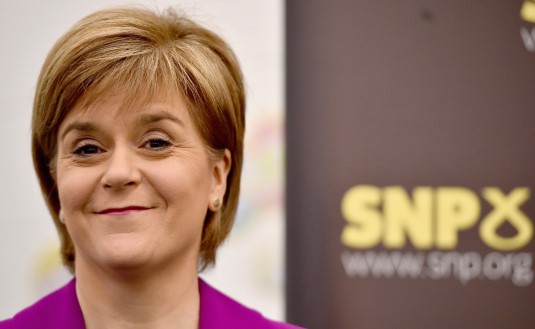
The reasons why people hate the Tories aren't hard to fathom. While writing my book, it was hard keeping the loathing from spilling onto every page. What Sturgeon said about hating Tories is common sense. The devastation they have wrought upon this country and its people, the completely unnecessary suffering inflicted, the poisoning of politics and turning neighbour against neighbour, the squandering of natural resources and the despoliation of the environment, if leading Tories ever find themselves before a revolutionary tribunal it will take longer to read out the charge sheet than their serving any custodial sentence handed down. Yet the Tories act all shocked and shook when this is pointed out to them. I recall a Question Time from many years ago when Owen Jones pointed out the devastating consequences of social security cuts to Iain Duncan Smith, whose reply was at once hurt, bewildered, and incredulous.
Putting to one side the occasion Zahawi referred to Jeremy Corbyn as "a dangerous antisemite", where does this faux hurt and preoccupation with politesse come from? It says two things about how Tory politics operates.
The first is an excuse for the Tories to employ a favoured stratagem. Despite being the country's wealthiest and most successful political party, a strand of its appeal speaks to, for want of a better phrase, an underdogging sensibility. Because Conservatism here, like elsewhere, stirs up fear to offer security it sets up rhetorical ruses, always amplified by their press, that the Tories are harried by remainers, woke warriors, humourless communists, liberal celebrities, asylum seekers and, if you believe Suella Braverman, Cultural Marxists. Why do you think leading Tories purposely brave the protesters outside their conference when more secure entrances are available? The crafting of standing up against wrong 'uns too numerous to mention feeds a contrived victim complex - the angrier and shoutier, the better. Indeed, during her conference speech last week setting up a new wall of enemies is exactly what Truss attempted to do with her "anti-growth coalition". Because Britain is (always) under siege, and the Tories are under siege, there's a fundamental identity between the two. Calling Tories bad names and casting aspersions on their motives will always be spun by its MPs and advocates as unfair attacks, as bullying. And sympathy (and votes) will be duly elicited.
More fundamentally, it points to the intimate relationship between social distance and how politics works. We've noted many occasions down the years how politicians and their media running dogs create their own universe with its own strategies, stakes, framings, and doxa. Combined with a decent whack, status, and institutional power, politics - or "Westminster" - insulates MPs from everyday pressures that bear down on the rest of us. They are not nor can they be more "representative" than ordinary party members. The best of them actively resist this, while the worst embrace it. And as climbing up the greasy poll calls on careerists to adopt its stated and unstated rules, it's no accident the establishments of the two main parties comprise the most awful people. The Tories, as a structurally dishonest outfit whose job is to present the minority interest of capital as the universal interest, largely define the rules and hypocrisies of the game. Politics is about power, but they - and the official opposition - work hard to make power a question of who runs the government. While crucially important, it obscures and masks the real flows of power, the anti-democratic character of the British constitution, and that the Tories are a class project. Though props to the Prime Minister for stating Tory intentions openly.
The elaborate bullshit of the Commons, cross-bench chumming, and the Tory affectation that politics shouldn't be taken too seriously and we're all in it together are all aspects of the concerted masking effort. The reason Zahawi and sundry idiots take umbrage at Sturgeon is because of her refusal to buy into these fictions. While a bourgeois politician, the SNP's politics - despite its constitutionalism - puts her and the party outside the system, and she likewise feels no compulsion to support its illusio. Hers was an unwelcome truth, an exposure - not unlike Joe Lycett's mockery of Truss a few weeks back, the media's inability to cope with Mick Lynch, and the entirety of the Corbyn episode - that disrespects the rules and makes visible the contingent, continued effort to pretend official politics is something it's not.
Image Credit
5 comments:
Good to see you back in the saddle Phil.
Oops. I guess you never left the saddle. First time in a while I have read your column.
Just custodial sentences ?
The Tory outrage reminds me of that scene in Casablanca where Louis the corrupt cop says "I'm shocked, shocked to find that there is gambling in this establishment!"
Good article but, with regard to the BBC interview, "that was" not quite "it". A journalist at The National counted Laura Kuennsberg interrupting Nicola Sturgeon 29 times over 16 minutes but interrupting Nadhim Zahawi just 5 times over 8 minutes.
Post a Comment